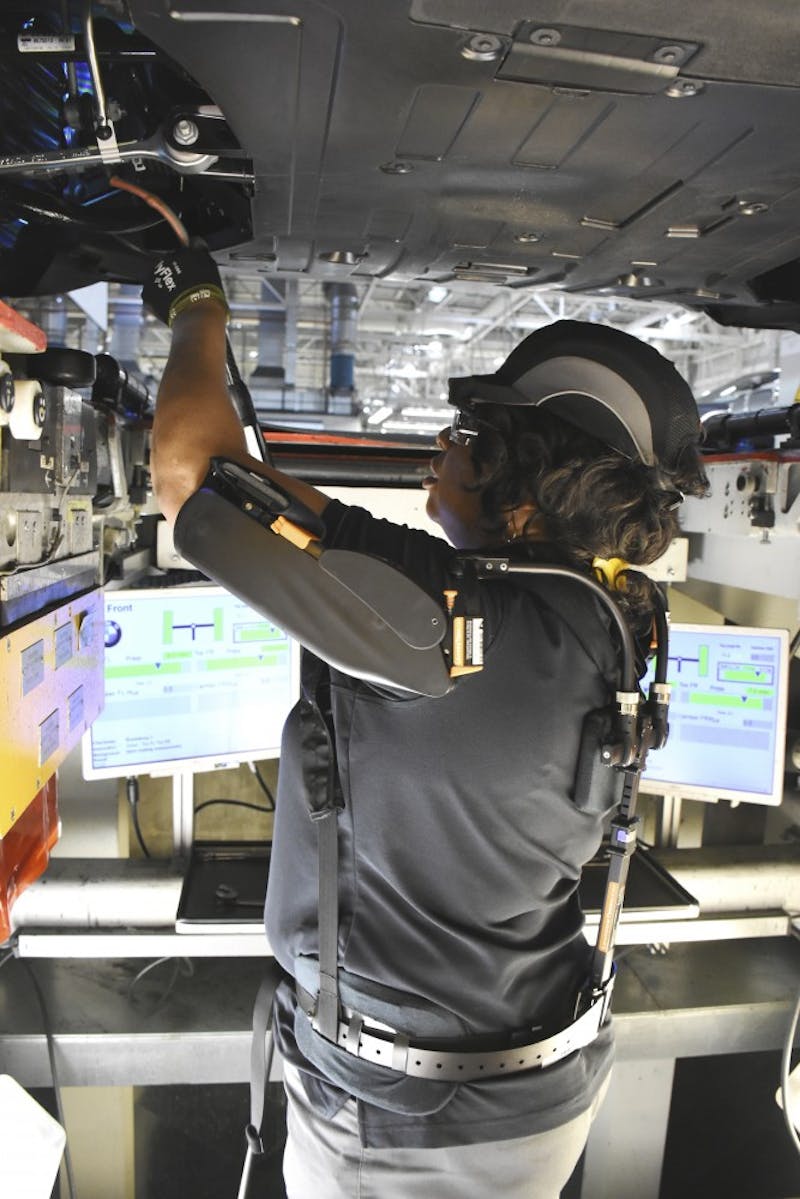

Taylor Johnston / For The Post
A correction has been appended.
A Russ College of Engineering and Technology graduate invented a new technology to help automotive production line workers when lifting heavy parts above their heads.
Frank Pochiro, 43, a 1997 OU alumnus who studied industrial technology, worked with Levitate and Ekso Bionics on the “Airframe” to assist production associates when performing over-the-shoulder and overhead work. The product reduces stresses, strains and fatigue on a person’s body while improving job satisfaction and quality.
After being hired at BMW in 2012, Pochiro was assigned to develop alternative options for workers who tend to the underbody of vehicles on an assembly line.
He and the companies came up with a backpack-like object that could help workers raise heavy exhaust systems to the underside of vehicles.
“I would joke with the tool designers that all we really need is an Iron Man Suit,” Pochiro said in an email. “In 2015, the new Vice President of Assembly announced he wanted our groups to more aggressively seek out a variety of innovations.”
It was the perfect time for him to propose the utilization of exoskeletons, such as the “Airframe,” in daily assembly line tasks, he said.
His project was originally inspired by a TED Talk involving Ekso Bionics, which produces wearable robots that help people with physical problems such as strokes and spinal cord injuries.
“I discovered they had developed a full body powered exoskeleton for the military,” Pochiro said in an email. “Through further research with Eksobionics, we ascertained that backpack style exoskeletons could provide arm support for above shoulder work and reduce injuries, fatigue, stresses and strains in the neck, back and shoulders.”
Pochiro and his group continued to explore full-body exoskeletons while deploying the backpack style exoskeletons.
The backpacks change the amount of arm support by doing 30 to 40 percent of the work so that workers do not have to, he said.
BMW is the first company to use that sort of technology, but other companies are following, such as Honda and Toyota, he said.

“I actually presented my success with the exoskeletons at a Transplanted Automotive Safety Forum conference and told the reps from many automotive manufacturers of this success,” Pochiro said in an email. “They then contacted the exoskeleton companies and are pursuing these devices in their facilities.”
After working in positions such as senior manufacturing engineer and engineering team leader at Bosch, an automotive parts supplier headquartered in Germany, for 10 years, he ran his own business for a year and a half. While operating that business, a headhunter called him.
“Someone at Bosch told the headhunter that I was no longer working at Bosch,” Pochiro said in an email. “They asked if I wanted to come in for a ‘conversation’ with BMW. It was an interview. It went very well.”
Pochiro is currently in the Process Planning group at BMW. He lives in South Carolina but travels to Germany a couple times each year to work with BMW.
“We plan the next generation of X Vehicles (X3, X4, X5, X6, X7),” Pochiro said in an email. “I am currently responsible for promoting innovations for manufacturing, process improvements, methods, and system rollout and trainings as well as special projects.”
While at OU, Pochiro was involved in organizations such as the Society of Plastics Engineers.
“(SPE) taught me a lot about plastics and working in a national organization, as well as being the treasurer (managing money, budgets, etc.),” Pochiro said in an email.
Pochiro said his professors had a major influence on his education and placement after graduating.
“I cannot say enough good things about all of them and how much they helped me grow as an individual, a student and a Bobcat,” Pochiro said.
Pochiro said his brother, Tony, stressed the importance of an education and played a big role in Pochiro going to college.
“He has also been my greatest confidant. I can always run anything and everything through him for his wealth of wisdom and knowledge,” Pochiro said in an email.
His wife, also a graduate of OU, is another influential person in his life.
“She constantly supports me and gives me confidence in all I do and who I am,” Pochiro said in an email.
Some advice Pochiro gives to fellow Bobcats is if someone tells you something cannot be done, keep going and always look at the problem from as many angles as you can.
“Use all of your senses for observation, think outside the box and outside your industry for solutions, surround yourself with positive people who like to collaborate and don’t have hidden agendas,” Pochiro said in an email. “Don’t be afraid to fail, keep trying, never give up unless you absolutely must and then still keep going.”
Correction: A previous version of this article misstated what Pochiro studied and who worked on the invention. The article has been updated to reflect the most accurate information.
Photos provided by: Frank Pochiro
Developed by: Taylor Johnston / For The Post